Rainbow chard is one of the leafy green vegetables that provides many nutritional values such as vitamins, minerals, and other phytochemical compounds.
Benefits of Rainbow Chard
Rainbow chard, like many other leafy greens, is rich in nutrients, vitamins, and phytochemicals. This vegetable is considered a source of antioxidants, flavonoids, vitamins, calcium, and iron. One cup of cooked rainbow chard provides 60% of your daily vitamin A needs, which is excellent for vision, skin, and eye health.
1. Nutritional Value of Rainbow Chard
Rainbow chard is packed with essential nutrients that contribute to its impressive health benefits. Just one cup (175 grams) of cooked rainbow chard contains:
- Calories: 35
- Protein: 3.3 grams
- Carbs: 7 grams
- Fiber: 3.7 grams
- Vitamin K: 477% Daily Value (DV)
- Vitamin A: 60% DV
- Magnesium: 36% DV
- Vitamin C: 35% DV
- Copper: 32% DV
- Manganese: 25% DV
- Iron: 22% DV
- Vitamin E: 22% DV
- Potassium: 20% DV
- Calcium: 8% DV
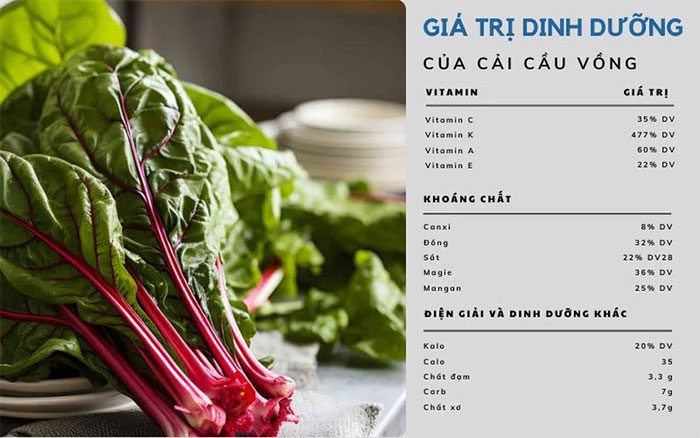
This vegetable is considered a source of antioxidants, flavonoids, vitamins, calcium, and iron. (Image: SKHN).
2. Health Benefits of Rainbow Chard
Rainbow chard offers numerous health benefits due to its rich nutritional profile. Here are some of the health benefits of rainbow chard:
2.1. Helps Lower Blood Sugar Levels
Rainbow chard contains many nutrients that can help lower blood sugar levels, including fiber.
High-fiber foods help slow down digestion. As a result, they can reduce the rate at which sugar is absorbed into the bloodstream, helping to stabilize blood sugar levels. Fiber also helps reduce insulin resistance, a condition linked to the risk of type 2 diabetes, heart disease, and obesity.
Moreover, rainbow chard is rich in antioxidants like alpha-lipoic acid (ALA), which has been shown to reduce insulin resistance and improve diabetes complications, including nerve damage.
2.2. May Promote Weight Loss
Another health benefit of rainbow chard is its potential to support weight loss. Eating more fiber-rich greens like rainbow chard can increase feelings of fullness after meals, reducing the risk of overeating and helping to control weight effectively.
Additionally, rainbow chard is only 35 calories per cup when cooked (175 grams). Therefore, this vegetable makes an excellent addition to a weight loss diet.
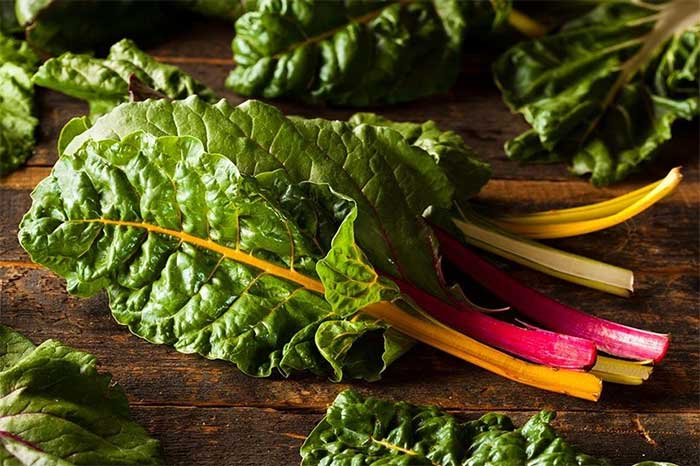
Rainbow chard is high in fiber, which can increase satiety and help control weight. (Image: Internet).
2.3. Boosts Brain Health
Rainbow chard has relatively high levels of potassium and vitamin K, both of which are essential for brain development. Additionally, rainbow chard contains natural nitrates that help increase blood flow to the brain, enhancing mental function.
Furthermore, the high beta-carotene content in rainbow chard is known to help prevent dementia in the elderly.
2.4. Maintains Good Cardiovascular Health
Anti-inflammatory components, phytonutrients, and antioxidants in rainbow chard work together to help lower blood pressure and improve cardiovascular function.
Potassium in rainbow chard also helps maintain proper blood pressure and cholesterol levels, which directly affect heart, liver, and digestive health.
2.5. Good for Bones
Rainbow chard contains a significant amount of calcium, making it a superfood for strong bones.
In particular, rainbow chard is also a rich source of vitamin K, which is beneficial for bone health. Therefore, regular consumption of rainbow chard is known to help prevent osteoporosis.
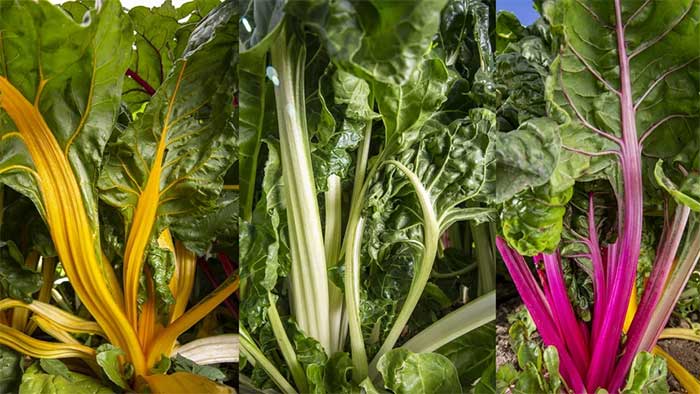
Rainbow chard contains both calcium and vitamin D – two important nutrients for strong bones. (Image: Internet).
2.6. Reduces Risk of Anemia
Iron deficiency is one of the most common causes of anemia, characterized by symptoms such as fatigue, weakness, chest pain, dizziness, headaches, difficulty concentrating, and other symptoms.
Rainbow chard is rich in iron and copper, both of which are essential for blood cell production. Therefore, by incorporating rainbow chard into your diet, you can help reduce the risk of anemia and maintain optimal energy levels.
2.7. Cancer Prevention
Like many other leafy greens, rainbow chard has anti-cancer properties due to its high content of vitamins E and C, zinc, beta-carotene, quercetin, and other essential elements. Notably, rainbow chard has a high phytonutrient content, which helps prevent cancers of the liver, skin, colon, prostate, ovaries, pancreas, breast, and lungs, contributing to the ability to kill cancer cells.
2.8. Improves Blood Circulation
Rainbow chard contains a high concentration of trace minerals, which are essential for the health of the endothelium (the inner lining of blood vessels), healthy blood vessels, and cardiovascular regulation. By consuming rainbow chard, you can improve blood vessel contraction, blood pressure, and nerve communication, ultimately leading to better blood circulation and heart health.
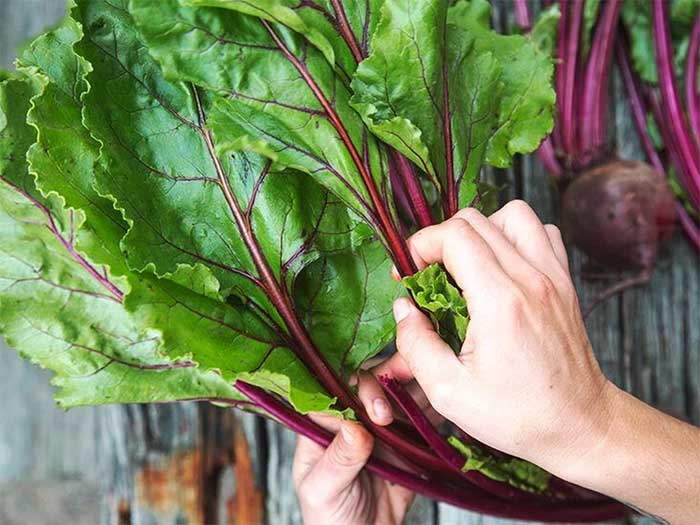
Rainbow chard contains many trace minerals beneficial for blood circulation. (Image: Internet).
2.9. Prevents Eye Diseases
A diet rich in vitamins C and E, beta-carotene, and zinc can help prevent macular degeneration and treat many chronic eye diseases. Rainbow chard is rich in these nutrients, making it an excellent addition to your diet to promote healthy eyes and prevent various eye issues, such as blurred vision and macular degeneration.
2.10. Keeps Hair Healthy
Biotin, also known as vitamin B7, is essential for shiny, healthy hair. Rainbow chard is one of the best natural sources of this vitamin. Therefore, adding rainbow chard to your diet can nourish your hair from within, making it stronger and softer.
3. Health Risks of Eating Rainbow Chard
While rainbow chard offers many benefits, it is important to be aware of potential risks associated with consuming this vegetable to ensure a suitable diet and preparation methods.
High Vitamin K Content
Rainbow chard contains a high amount of vitamin K, which is essential for blood clotting. However, individuals taking anticoagulant medications, such as warfarin, may be affected if they consume vitamin K inconsistently from food sources like rainbow chard. Sudden changes in vitamin K consumption can hinder the effectiveness of these medications. If you are taking anticoagulants, you should consult your doctor about your diet.
Contains Oxalate
Like other green vegetables, rainbow chard contains a high level of oxalate, which can lead to the formation of calcium oxalate stones in the kidneys. However, you can still include nutrient-rich foods high in oxalate by taking precautions. For instance, staying hydrated, limiting sodium intake, and ensuring adequate calcium levels can help reduce the risk of kidney stone formation.
May Cause Allergic Reactions
Although not common, there have been reports of allergies to rainbow chard. If you experience symptoms of an allergic reaction, such as hives, itching, or swelling after consuming rainbow chard, you should stop eating this vegetable and seek medical attention if the symptoms are severe and do not subside.
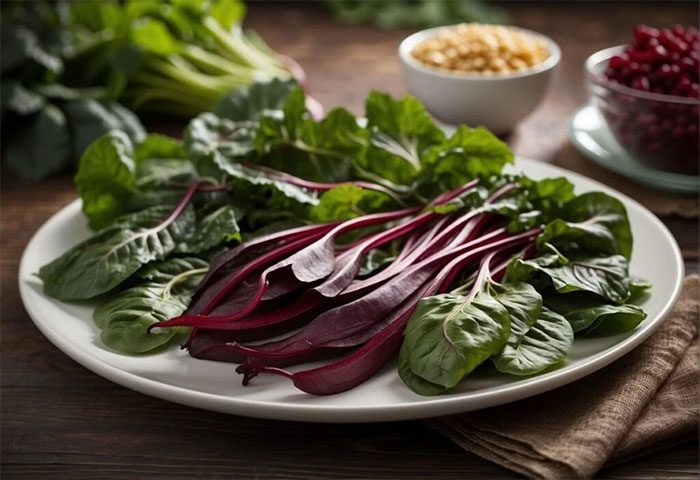
Rainbow chard contains a high level of oxalate, which can lead to the formation of kidney stones. (Image: Internet)
4. Frequently Asked Questions
4.1. What does rainbow chard taste like?
Similar to spinach, most types of rainbow chard have a slightly bitter taste when eaten raw. Although not as bitter as kale, the bitterness in this vegetable decreases when the leaves are cooked, resulting in a milder, sweeter flavor and a softer texture. The stems of rainbow chard have a taste similar to celery, complemented by the flavor of beetroot.
4.2. Can rainbow chard be juiced?
People can use rainbow chard to make juice, but like some other leafy greens, due to its high oxalate content, consuming too much rainbow chard juice can lead to the accumulation of kidney stones.
Therefore, it is advisable to incorporate rainbow chard into your diet in various ways, such as cooking, making salads, and consuming it in moderation. This way, you can enjoy a diverse range of nutrients from different food sources.
The above are the health benefits of rainbow chard. Overall, this vegetable is rich in nutritional value and good for health, but it is still important to include greens in your diet sensibly.



















































